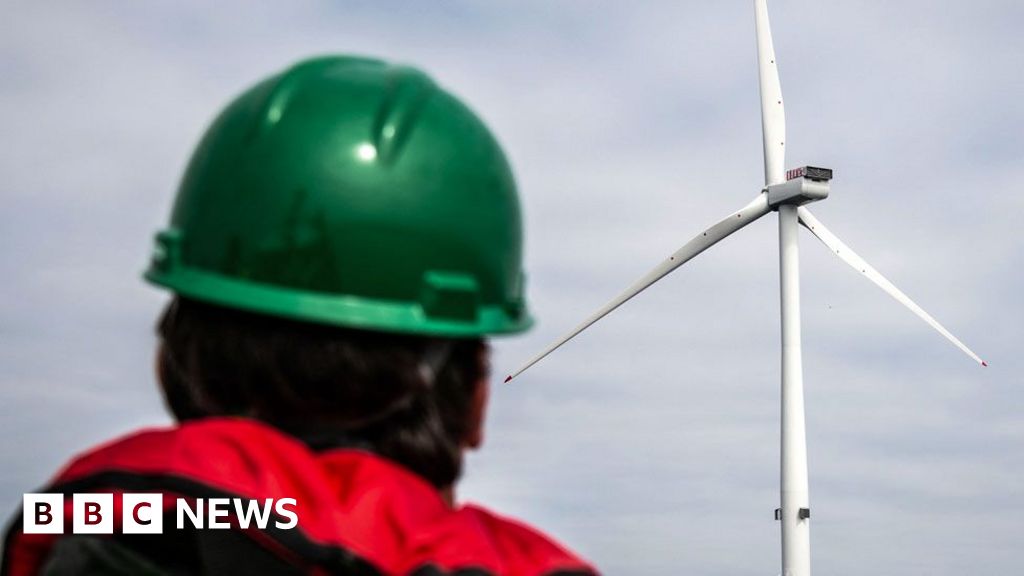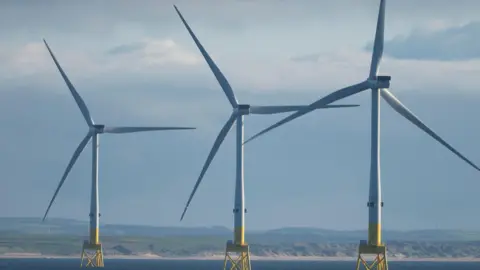GB Energy: Labour teams with Crown Estate to boost wind energy

 Getty Images
Getty ImagesThe government is set to use British seabed owned by the Crown Estate to help build windfarms which it hopes will power 20 million homes.
It is the first major plan to be announced by Great British Energy, the government’s new company aimed at increasing renewable energy that is set to receive £8.3bn in state funding over the next five years.
Energy Secretary Ed Miliband claimed the initiative would “lead to lower bills” for households.
But the Conservatives said GB Energy was “nothing but a gimmick that will end up costing families”.
The deal means the Crown Estate – which manages a huge portfolio of property and land and helps fund the Royal Family – will lease the land on which windfarms can be developed and built.
The Crown Estate owns the majority of the seabed which stretches up to 12 nautical miles from the mainland.
Mr Miliband claimed investments in windfarms as well as other renewables such as solar energy would eventually lead to lower bills, but “it’s not going to happen overnight”.
He told BBC Breakfast that as renewable energy projects “start coming online we’ll start to see the effect on bills. We are going as fast as we can.”
The government believes it can cut the time it takes to get windfarms producing power by half. It typically takes between 10 and 15 years to build offshore windfarms.
Labour’s hope is that GB Energy, a key manifesto pledge, will reduce UK “over-reliance” on fossil fuel markets, with prices rising rapidly after Russia’s invasion of Ukraine.
This in turn pushed up the pace of general price rises, contributing to the cost-of-living crisis.
Prime Minister Keir Starmer said that the plans were “turbocharging our country toward energy security”, and promised that it would lower energy bills.
However, the Conservatives have said GB Energy “will end up costing families, not cutting bills”.
“Labour have already been forced to admit that their flagship energy company won’t generate any energy, and now we know it’s a financial black hole – funnelling taxpayers’ money into reducing risk for multi-million-pound energy companies,” said shadow energy secretary Claire Coutinho.
The government is providing GB Energy with £8.3bn of funding but hopes to attract £60bn of private investment.
The aim is to get windfarm projects that could generate between 20GW and 30GW of offshore power to lease stage by 2030.
The Crown Estate already had this as a target, but on Thursday the government confirmed it would help.
Government officials say the involvement of the Crown Estate will accelerate the development of fixed and floating offshore wind farms, but critics say that the real bottlenecks are connecting to the power grid.
In addition, £8bn over the length of the parliament is a fraction of the £28bn a year the Labour Party originally wanted to spend on a green revolution that it hoped would decarbonise electricity generation by 2030 – a target that most experts in the energy industry consider unrealistic.
The agreement is only for projects around England and Wales, but Labour is also in discussions with the Scottish government and Crown Estate Scotland on support for local projects.
Last year, the Northern Ireland Executive and the Crown Estate agreed a statement of intent towards establishing leasing for offshore windfarms.
Northern Ireland currently has no offshore windfarms after a number of projects were abandoned at the planning stage.
GB Energy will be “at the heart of the government’s mission to make Britain a clean energy superpower”, the government said.
It added that the company will take stakes in energy projects to help speed them up.
This includes giving a boost to technologies including carbon capture and storage, which has yet to be deployed at scale, along with hydrogen, wave and tidal energy.
Eventually, GB Energy may take a controlling interest in some renewables generation projects.
The government wants GB Energy to speed up renewable energy projects by helping them develop, and invest in them alongside private investors.
It wants it to work with local energy projects and the nuclear industry.
Alongside a new law to create GB Energy, the government will also loosen regulation on the Crown Estate so it can invest and borrow more.
The government has taken a number of decisions on renewables generation since coming to power in the recent election.
It has approved three big onshore solar farm projects which have faced local opposition.
Related
Youth football teams hold minute’s silence for 10-year-old Poppy Atkinson
Youth football teams and grassroots clubs across the country have held a minute’s silence at the start of their games to commemorate a 10-year-old girl who di
Girl’s death sparks minute’s silence at football matches nationwide
10-year-old Poppy Atkinson was killed when she was struck by a car during a training session at Kendal Rugby Club in Cumbria. Clubs from Leeds to London
Liverpool fans’ Uefa claim can be heard in England, judge…
The high court, sitting in Liverpool, heard Uefa had relied upon the principle that English courts will not inquire into the legality of actions by foreign gove
Alan Shearer’s Premier League predictions including Manchester United vs Arsenal
Caption: Alan Shearer?s Premier League predictions credit: Getty / Metro After some impressive results for English sides in Europe the focus is












